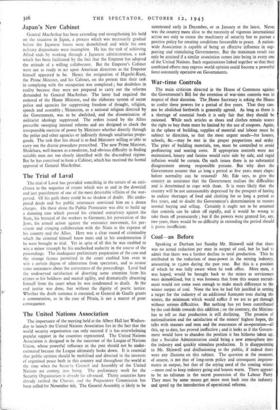Coal—as Before
Speaking at Durham last Sunday Mr. Shinwell said that there was no actual reduction per man in output of coal, but he had to admit that there was a further decline in total production. This he attributed to the reduction of man-power in the mining industry, amounting to 13,000 during the past year. But this is a position of which he was fully aware when he took office. More men, it was hoped, would be brought back to the mines as servicemen were demobilised, but it was foreseen that from this source recruit- ment would not come soon enough to make much difference to the winter output of coal. None the less he had felt justified in setting a target for the industry of an additional 8,000,000 tons during the winter, the minimum which would suffice if we are to get through without serious difficulties. But nothing has yet been contributed by the coal-fields towards this addition ; on the contrary, the Minister has to tell us that production is still declining. The promise of nationalisation and the satisfaction of the miners' highest hopes, the talks with masters and men and the assurances of co-operation—all this, up to date, has proved ineffective ; and it looks as if the Govern- ment would have to abandon the position it has hitherto taken up, that a Socialist Administration could bring a new atmosphere into the industry and quickly stimulate production. It is disappointing to Mr. Shinwell and disillusioning to the public, if indeed there were any illusions on this subject. The question at the moment, of course, is not that of long-term policy and consequent improve- ments in output, but that of the crying need of the coming winter —more coal to keep industry going and houses warm. There appears to be no talisman in the secret possession of the Labour Party. They must by some means get more men back into the industry. and speed up the introduction of operational reforms.


























 Previous page
Previous page